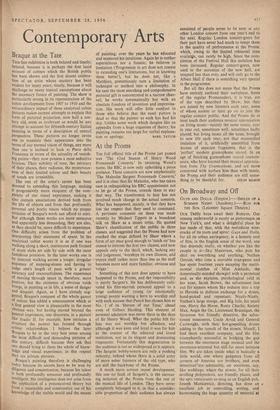Contemporary Arts
Braque at the Tate
THIS fine exhibition is both belated and timely; belated, because it is perhaps the first lucid account of cubism which the British public has been shown and the first decent celebra- tion of an artist whose mastery has been evident for many years; timely, because it will challenge so many topical assumptions about the necessary future of painting. The show is particularly strong in its representation of the cubist development from 1907 to 1910 and the extraordinary impact of these analytical cubist pictures makes earnest attempts to explain this form of pictorial projection, .now half a cen- tury old, seem as irrelevant as would be any attempt to account for fifteenth-century Italian painting in terms of a description of central Perspective. These pictures no longer invite one to translate their appearance into the terms of our normal vision of things, any more than one is inclined to look at Piero della Francesca in terms of the actuality of vanish- ing points—they now possess a most seductive lyricism. Their subtlety of tone, the intricacy of their planes, their radiance, the mysterious- ness of their limited colour and their beauty Of touch are irresistible.
The rest of the artist's career has been devoted to extending this language, making it progressively more eloquent of the com- plexity of (Air visual experience, making it also contain associations derived both from the life of objects and from that profoundly Personal and poetic vision which no proper criticism of Braque's work can afford to omit. But although these works are more sensuous and apparently less demanding, they are also, as they should be, more difficult to experience. One difficulty arises from the problem of interpreting their statement of space. In the analytical cubist works it is as if one was walking along a short, continuous path formed of stone slabs set side by side with the most fastidious precision. In the later works one is by contrast walking across a longer, irregular sequence of stepping-stones and having to judge one's length of pace with a greater accuracy and resourcefulness. The experience of moving through space is, therefore, more Positive, but the existence of obvious voids brings, in painting as in life, a sense of danger and disquiet. Again, as I have already sug- gested, Braque's conquest of the whole gamut of colour has added a sensuousness which at a first general view is pleasurable in the most obvious way, but having moved beyond the 'general impression, one discovers, in a picture like Studio 11, for example, how intricate a structure the painter has formed through colour relationships. I believe the later %Agues to be in the very best sense among the most difficult and demanding pictures of this cehtury, difficult because they ask that One should bring to them the whole of know- ledge and visual experience; in this respect they are private pictures.
Braque's painting therefore is challenging today because its secrets have 40 be won by diligence and concentration, because his talent is both profoundly sensuous and profoundly intelligent. His intelligence does not arise from the application of a preconceived theory but from a reasonable and constructive use of his knowledge of the visible world and the means of painting; over the years he has educated and mastered his intuitions. Again he is neither superstitious nor a fanatic; he believes in limitation (Progression in art does not consist in extending one's limitations, but in knowing them better'), but he does not, like a Matthieu, pretentiously turn a limitation of technique or method into a philosophy. In his case the most searching and comprehensive pictorial gift is concentrated in a narrow chan- nel; he works systematically but with an absolute freedom of invention and improvisa- tion. His work will offer little comfort to those who believe that the easel picture is dead or that the painter as such has had his day. Unlike some work which dangles like an appendix from a huge organism of theory, his painting remains too large for verbal explana-


































 Previous page
Previous page